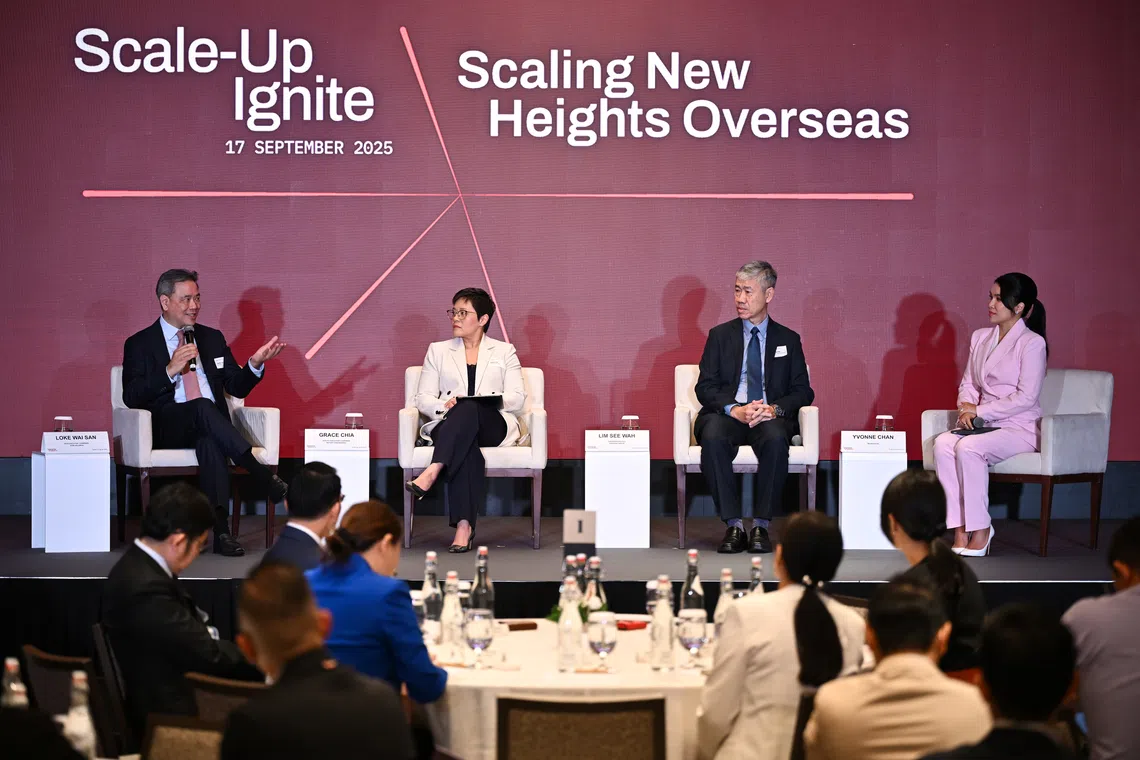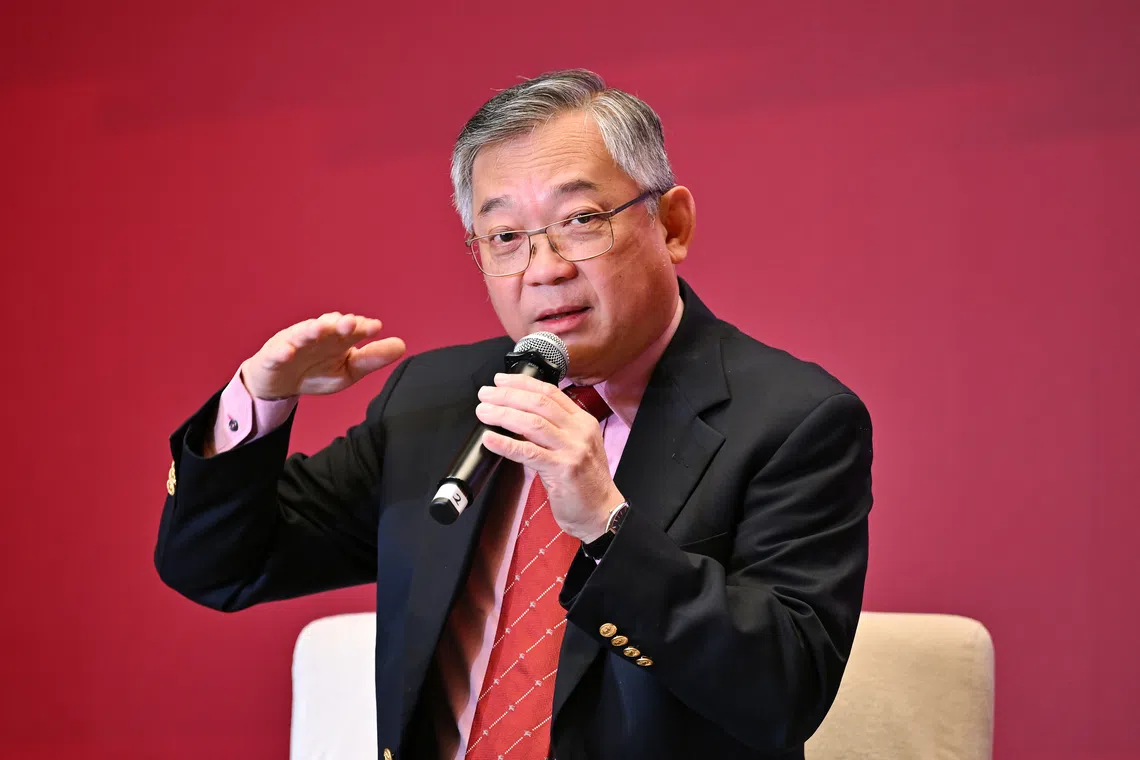S’pore firms boost revenue, expand into new markets with Enterprise Singapore’s Scale-Up programme
Sign up now: Get ST's newsletters delivered to your inbox

Minmed's founder and chief executive Eric Chiam took the opportunity to tap Enterprise Singapore’s Scale-Up programme to build the company’s digital capabilities and adopt a more agile approach to innovation.
PHOTO: ST FILE
Follow topic:
SINGAPORE - Local health group Minmed was at a crossroads in 2021, caught between its bricks-and-mortar business model and the surge in digital healthcare triggered by the Covid-19 pandemic.
Its founder and chief executive, Dr Eric Chiam, took the opportunity to tap Enterprise Singapore’s (EnterpriseSG) Scale-Up programme to build the company’s digital capabilities and adopt a more agile approach to innovation.
Minmed mapped out growth areas such as expanding its health screening options, strengthening wellness services and streamlining processes.
A key outcome was the identification of generative artificial intelligence as a tool to boost efficiency and improve service delivery.
“The Scale-Up programme has empowered our management team to embrace the foundational principles of AI – from concept to execution,” Dr Chiam told The Straits Times on Sept 17.
“We have progressively built additional AI agents, including tools for medical summarisation, patient nudges and reminders, business analytics and workflow automation.”
To date, the Scale-Up programme, which started in 2019,
The programme aims to help high-potential Singapore companies grow further and become global champions.
Companies with global headquarters in Singapore that have demonstrated a strong track record of growth and good leadership are invited to join the programme by EnterpriseSG.
The firms must also have the ambition to take their business global and to transform.
In Minmed’s case, it was able to automate 40 per cent of customer inquiries and 85 per cent of medication checks, cutting response times from six hours to 12 seconds with an AI-powered chatbot.
This freed up its staff for higher-value interactions and enabled the company to offer personalised screening recommendations by analysing patients’ medical histories.
Speaking at EnterpriseSG’s Scale-Up Ignite 2025 event on Sept 17, the government agency’s managing director Cindy Khoo said companies in the first seven cohorts of Scale-Up, from 2019 to 2023, grew their combined revenue by $2.5 billion – 37 per cent higher than before they joined the programme.
Their overseas revenue also rose 53 per cent, with seven in 10 companies expanding successfully into new markets like Indonesia, the Philippines and Thailand.
At the same time, 80 per cent of the companies launched new products and services, while nearly half grew their business through broader product offerings and entry into new markets via mergers and acquisitions or joint ventures.
The programme also created about 800 jobs in areas such as digital transformation and regional business development.
iFast Corporation is another example of how firms have benefited from the Scale-Up programme.
The Singapore-listed digital banking and wealth management platform used the initiative to refine its digibank strategy after acquiring a British bank, now known as iFast Global Bank (iGB).
iGB has since amassed more than $1 billion in deposits, doubled its revenue over the past year and turned profitable in the fourth quarter of 2024.
EnterpriseSG also facilitated iFast’s entry into Thailand in 2025 by linking it with Thailand Securities Public Company, marking its first move into the market.
Both parties are in talks to co-develop a fintech platform that would enable Thai brokers and accredited investors to trade offshore bonds with real-time pricing.
“These are not just business wins – they are proof that Singapore companies can compete and win on the global stage,” Ms Khoo said at the event held at Park Royal Collection Marina Bay.
She added that EnterpriseSG will support companies in adopting AI through cloud credits, expert consulting and hands-on training.
It will also offer learning journeys to AI centres of excellence to give firms first-hand insights into practical applications.
More Scale-Up X programmes will also be introduced to help firms deepen core capabilities and execute growth strategies.
The first, a mergers and acquisitions programme to be launched in November 2025, will offer the latest insights into deal strategy and execution.

A panel discussion by Scale-Up alumni on their growth journey, with (from left) Mr Loke Wai San, non-executive chairman, AEM Holdings; Ms Grace Chia, deputy executive chairman, Rotary Engineering; Mr Lim See Wah, chairman and CEO, Hyphens Group; and moderated by Ms Yvonne Chan, on Sept 17.
ST PHOTO: LIM YAOHUI
A market insights initiative will follow in early 2026, giving companies access to expert networks and sector intelligence.
Firms will be able to consult industry practitioners one-on-one or commission market research to guide business decisions.
“Whether it’s navigating new markets with our network of overseas centres or developing capabilities and resilience in an evolving geopolitical landscape, our goal is to help companies accelerate their growth and remain competitive,” said Ms Khoo.
At a dialogue session at the event, Deputy Prime Minister Gan Kim Yong said the global tariff situation will eventually slow down the global economy.
But there are still emerging opportunities, such as companies repositioning their supply chains or channelling investments into countries with lower tariffs like Singapore, which faces a baseline tariff of 10 per cent imposed by the US.
“It’s important for countries like Singapore to move very quickly to reach out to see how we can attract more investments into Singapore,” said DPM Gan, who is also Minister for Trade and Industry.

Deputy Prime Minister Gan Kim Yong speaking at the Enterprise Singapore’s Scale Up Ignite 2025 event on Sept 17.
ST PHOTO: LIM YAOHUI
For companies here, he noted that they should not adopt a “wait-and-see” attitude, but a “see-and-act” approach while keeping a close watch on global developments.
“We can invest in our people training – upgrade them for the future and get them ready for the skills of the future,” he said.
“At the same time, act to explore opportunities, new markets, new supply chains, new sources of supplies and even new shipping requirements... so begin to explore how you can reposition yourself.”


